

Philip Pilkington: The Ideology to End Ideologies – A Response to Corey Robin on Nietzsche, Hayek, Mises, and Marginalism. By Philip Pilkington, a writer and research assistant at Kingston University in London.
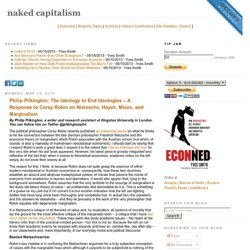
You can follow him on Twitter @pilkingtonphil The political philosopher Corey Robin recently published an interesting essay on what he thinks to be the connection between the late German philosopher Friedrich Nietzsche and the economic theory of marginalism which Robin associates with the Austrian school (but which, of course, is also a mainstay of mainstream neoclassical economics). I should start by saying that I respect Robin’s work a great deal; I respect it to the extent that I did an interview with him for this very site when his last book appeared. Mainstream Economics as Ideology: An Interview with Rod Hill and Tony Myatt — Part I. Mainstream Economics as Ideology: An Interview with Rod Hill and Tony Myatt — Part II. Rod Hill and Tony Myatt are Professors of Economics at the University of New Brunswick in Saint John and Fredericton (respectively).
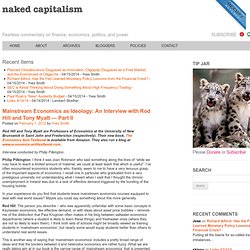
Their new book, The Economics Anti-Textbook is available from Amazon. They also run a blog at www.economics-antitextbook.com. Are macroeconomic methods politically biased? In a recent post, Steve Williamson writes: The tools of modern macroeconomics are no more the tools of right-wingers than of left-wingers.
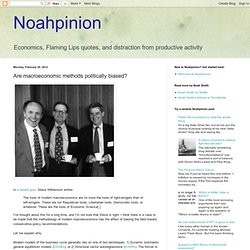
These are not Republican tools, Libertarian tools, Democratic tools, or whatever. These are the tools of Economic Science[.] Economists' political bias and model choice. One can count on Gilles Saint-Paul for innovative research topics.
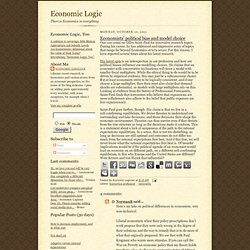
During his career, he has addressed and impressive array of topics that range far beyond Economics strictu sensu. For this reason, I have reported several times about his latest research. Richard H. Serlin: Perhaps the Biggest Libertarian Bias in Economics. Oxford Macroeconomist Simon Wren-Lewis has an excellent recent post on libertarian bias in economics: In RBC models, all changes in unemployment are voluntary.
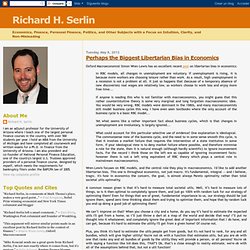
If unemployment is rising, it is because more workers are choosing leisure rather than work. As a result, high unemployment in a recession is not a problem at all. It just so happens that (because of a temporary absence of new discoveries) real wages are relatively low, so workers choose to work less and enjoy more free time...If anyone is reading this who is not familiar with macroeconomics, you might guess that this rather counterintuitive theory is some very marginal and long forgotten macroeconomic idea. You would be very wrong. Wren-Lewis focuses on RBC models, and the central role they play in macroeconomics. A common reason given is that it’s hard to measure total societal utils. The Weaponization of Economic Theory.
Europe’s three needs: a debt write-down, a real central bank, and a more efficient tax system Brussels Talk, Madariaga College, Governing Globalisation in a World Economy in Transition, June 27, 2012 What can Europe learn from the United States? First, the United States – like Canada, England and China – have central banks that do what central banks outside of Europe were created to do: finance the budget deficit directly.
I have found that it is hard to explain to continental Europe just how different the English-speaking countries are in this respect. There is a prejudice here that central bank financing of a domestic spending deficit by government is inflationary. This is nonsense, as demonstrated by recent U.S. experience: the largest money creation in American history has gone hand in hand with debt deflation. It is the commercial banks that have created the Bubble Economy’s inflation, from North America to Europe. Philip Pilkington: The New Monetarism Part I – The British Experience. By Philip Pilkington, a writer and journalist based in Dublin, Ireland.
You can follow him on Twitter at @pilkingtonphil. Philip Pilkington: The New Monetarism Part II – Holes in the Theory. By Philip Pilkington, a writer and journalist based in Dublin, Ireland. You can follow him on Twitter at @pilkingtonphil In the first part of this piece we looked at the Thatcher government’s monetarist experiment in the early 1980s.
It did not end well. So we must ask: did the Thatcher government and the monetarists believe in what they were doing or were they cynically using monetarist policy as a device to destroy large parts of British industry in order to destroy the trade union movement? Philip Pilkington: The New Monetarism Part III – Critique of Economic Reason. By Philip Pilkington, a writer and journalist based in Dublin, Ireland. You can follow him on Twitter at @pilkingtonphil During the Great Depression and the war years monetary policy in Britain had proved largely ineffective. In the meantime it was shown that government spending could cure economic depressions and return the economy to full or even super-full employment. After the war most political parties in Britain were thus interested in using fiscal policy to generate full employment rather than rely on the vagaries of monetary policy.
Bubbles and Bailouts: Why Some Economists Failed. Economists have been criticized for their performance during the financial crisis, rightly at times, but not all of the criticism has been fair.
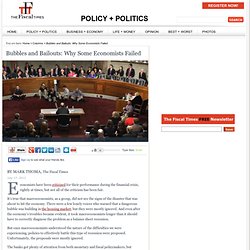
It's true that macroeconomists, as a group, did not see the signs of the disaster that was about to hit the economy. There were a few lonely voices who warned that a dangerous bubble was building in the housing market, but they were mostly ignored. And even after the economy’s troubles became evident, it took macroeconomists longer than it should have to correctly diagnose the problem as a balance sheet recession.
But once macroeconomists understood the nature of the difficulties we were experiencing, policies to effectively battle this type of recession were proposed. Philip Mirowski: The Seekers, or How Mainstream Economists Have Defended Their Discipline Since 2008 – Part II. By Philip Mirowski, Carl Koch Professor of Economics and the History and Philosophy of Science University of Notre Dame.
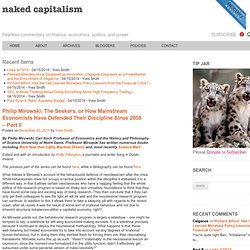
Philip Mirowski: The Seekers, or How Mainstream Economists Have Defended Their Discipline Since 2008 – Part III. By Philip Mirowski, Carl Koch Professor of Economics and the History and Philosophy of Science University of Notre Dame.
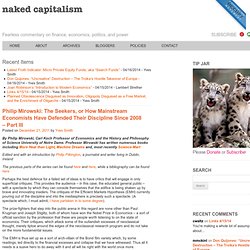
Professor Mirowski has written numerous books including More Heat than Light, Machine Dreams and, most recently Science-Mart.